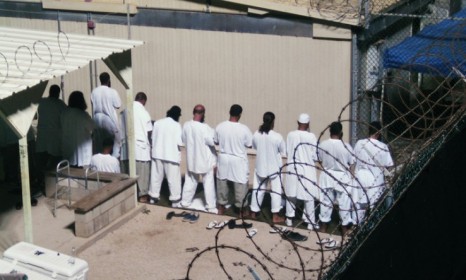The secret Gitmo documents: 6 takeaways
A bankrupt Osama bin Laden temporarily handed off control of al Qaeda in 2001, and some of his followers reportedly used impotence drugs to keep their focus on terrorism

A free daily email with the biggest news stories of the day – and the best features from TheWeek.com
You are now subscribed
Your newsletter sign-up was successful
The latest document dump from the secrets-sharing group WikiLeaks shines a light on more than 700 of the suspected terrorists who have been held by the U.S. military at Guantanamo Bay. The risk assessments, detainment records, and backstories of the detainees were vetted by several news organizations, who found that the history of the Guantanamo prison is littered with contradictions, bad options, innocent bystanders, and dangerous characters. Here, six new takeaways from the latest WikiLeaks dossier:
1. Osama bin Laden, broke and on the run, passed off control of al Qaeda
"On Sept. 11, 2001, the core of al Qaeda was concentrated in a single city: Karachi, Pakistan," reports The Washington Post. They watched the attacks on New York and Washington on TV from a safe house. Bin Laden and his key lieutenants then spent the next three months traveling in Afghanistan, preparing for war and further terrorist attacks. Bin Laden escaped to his cave complex in Tora Bora in November 2001, then fled to Pakistan in mid-December. He was so desperate for money that he had to borrow $7,000. Also that month, apparently fearing capture or death, bin Laden passed off control of al Qaeda to the group's Shura Council. The documents don't specify when bin Laden retook control.
The Week
Escape your echo chamber. Get the facts behind the news, plus analysis from multiple perspectives.

Sign up for The Week's Free Newsletters
From our morning news briefing to a weekly Good News Newsletter, get the best of The Week delivered directly to your inbox.
From our morning news briefing to a weekly Good News Newsletter, get the best of The Week delivered directly to your inbox.
2. Detainees vowed a "nuclear hellstorm" if bin Laden were killed
Khalid Shaikh Mohammed — the self-proclaimed 9/11 mastermind best known as KSM — told interrogators that, should bin Laden be killed or captured, al Qaeda would unleash a "nuclear hellstorm" on the West. Another senior al Qaeda commander claimed the group had planted a nuclear bomb somewhere in Europe.
3. Some terrorists used drugs to promote impotency
Abd al-Ramin al-Nashiri, the accused planner of the USS Cole attack, says he reported directly to bin Laden and was "more senior" than KSM. And in a sign of his dedication, Nashiri "reportedly received injections to promote impotence and recommended the injections to others so more time could be spent on the jihad (rather than being distracted by women)."
A free daily email with the biggest news stories of the day – and the best features from TheWeek.com
4. At least 150 innocent people were sent to Gitmo
Of the 779 people detained at Gitmo over the last decade, at least 150 were found to be innocent men — shepherds, chefs, farmers, and drivers, for example — who were in the wrong place at the wrong time, or just plain wronged. Another 380 were deemed low-level foot soldiers, many of whom have been repatriated.
5. At least 160 "high risk" detainees got out of Gitmo
Of the 600 or so detainees who have been released or transferred to another country, at least 160 were labeled "high risk" by military interrogators. These include at least 10 detainees who turned (or returned) to terrorism. But it's not all bad. Abu Sufian Ibrahim Ahmed Hamuda bin Qumu was found to have close ties to al Qaeda after his release; and he's now reportedly training Libya's rebels. Indeed, the designation of risk level appeared to be somewhat haphazard, NPR says.
6. Lots of countries had a crack at Gitmo detainees
The documents don't discuss the controversial interrogation techniques used at Gitmo, but they do note that several other nations sent their own agents to the prison camp to question detainees. China, Russia, Tajikistan, Yemen, Saudi Arabia, Jordan, Kuwait, Algeria, and Tunisia all sent over agents, as did Britain. In one case, a Saudi prisoner watered down his incriminating testimony after talking to his own country's agents.
Sources: Washington Post, New York Times, Telegraph, NPR, LA Times
-
 Why are election experts taking Trump’s midterm threats seriously?
Why are election experts taking Trump’s midterm threats seriously?IN THE SPOTLIGHT As the president muses about polling place deployments and a centralized electoral system aimed at one-party control, lawmakers are taking this administration at its word
-
 ‘Restaurateurs have become millionaires’
‘Restaurateurs have become millionaires’Instant Opinion Opinion, comment and editorials of the day
-
 Earth is rapidly approaching a ‘hothouse’ trajectory of warming
Earth is rapidly approaching a ‘hothouse’ trajectory of warmingThe explainer It may become impossible to fix